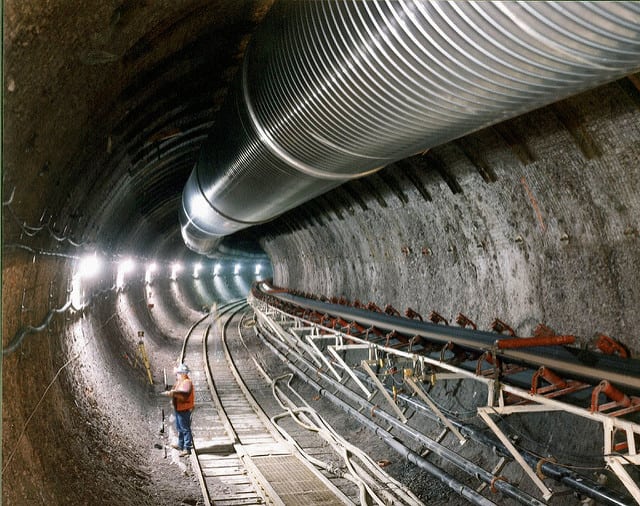
The House Energy and Commerce Committee on Wednesday overwhelmingly approved legislation that would allow the Energy Department to contract for interim storage of spent nuclear reactor fuel even as it waits on a ruling on a permanent repository.
The amended version of the Nuclear Waste Policy Amendments Act of 2017 reverses language in the draft legislation that would have required the Nuclear Regulatory Commission to decide on a license application to build a permanent resting site for U.S. nuclear waste before entering into any agreement on interim storage. Instead, the Department of Energy would be able to contract for one “monitored retrievable storage” site ahead of that milestone.
Committee members voted 49-4 to send the updated bill to the full House.
“Let me be clear, this amendment does not remove the federal government’s responsibility” to site a permanent nuclear waste repository, which DOE intends to build at Yucca Mountain in Nevada, said Rep. John Shimkus (R-Ill.), the bill’s sponsor.
The legislation ensures that all activity associated with the transportation and storage of spent fuel, including any interim storage program, is part of and works toward the goal of permanent geologic disposal, according to a summary of the bill.
Shimkus sponsored the interim-storage amendment to his bill, along with another amendment that would increase the maximum allowed storage capacity at Yucca Mountain from 70,000 to 110,000 metric tons. As many lawmakers have noted, the United States already has more than 70,000 metric tons of nuclear waste awaiting disposition.
In addition, Shimkus agreed to remove language from his bill that could have undercut ongoing federal versus state litigation in Nevada about whether the state can decide if using the water for the Yucca Mountain Project is a “beneficial use.”
Tens of thousands of tons of defense and commercial nuclear waste are stored across the country, waiting on the Department of Energy to meet its legal mandate to collect, transport, and permanently dispose of the material. The 1987 amendment to the 1982 Nuclear Waste Policy Act directs that the waste be deposited in a geologic repository at Yucca Mountain. Progress on the site has been halting in the three decades since then, with the Obama administration canceling the Yucca program wholesale and the Trump administration reviving it.
The proposed DOE budget for fiscal 2018 would provide $110 million for restarting licensing activities for Yucca Mountain, along with $10 million to develop a “robust” interim storage program to consolidate U.S. spent fuel while the permanent repository is built. The Nuclear Regulatory Commission would receive $30 million for to reopen licensing for the Nevada facility.
In an effort to ensure the federal government meets that obligation, Shimkus’ bill would clarify that the Energy Department, and no other federal agency, has the authority to manage the federal land on which Yucca Mountain sits, and that DOE has the right to use Nevada’s territorial water at the site. The bill would also make the Environmental Protection Agency the sole regulator of air quality at the site, skirting state regulators.
Committee members emphasized the need to make concrete strides in final disposition of the nation’s nuclear waste, which includes more than 75,000 metric tons of spent reactor fuel now stored on-site at nuclear plants around the country. That amount grows by about 2,000 tons per year.
In making the case for the bill, House Energy and Commerce Committee Chairman Greg Walden (R-Ore.) noted in a commentary this week in the East Oregonian newspaper that Yucca Mountain would also store waste piling up at the Department of Energy’s Hanford Site.
“This issue has bedeviled the country for over 30 years,” said Rep. Joe Barton (R-Texas).
However, Rep. Ben Ray Lujan (D-N.M.) quoted several current and former Western lawmakers as expressing concern that interim storage could become de-facto permanent storage.
New Jersey-based Holtec International has applied for an NRC license to build an interim storage facility in southeastern New Mexico with capacity to store up to 120,000 metric tons of spent fuel. Waste Control Specialists also last year applied for its own license for a storage site in West Texas; however, in April the Dallas company asked the NRC to suspend review of the application pending completion of WCS’ planned merger with EnergySolutions, which a federal judge blocked last week.
Lujan was among the four lawmakers to vote against the bill, along with Reps. Eliot Engel (D-N.Y.), Jan Schakowsky (D-Ill.), and Dave Loebsack (D-Iowa).
The full House will take up the legislation following its Independence Day recess next week. It faces sure opposition from the fiercely anti-Yucca Nevada delegation: Sen. Dean Heller (R-Nev.) said in a statement this week the bill would be “dead on arrival in the Senate.”
“The only real solution to our nation’s nuclear waste problem is through consent based siting like in my bipartisan, bicameral legislation, the Nuclear Waste Informed Consent Act,” Heller said. “We owe it to the American taxpayer to move past the failed policies of Yucca Mountain. I will continue to stand with the State of Nevada and fight this reckless proposal every step of the way in the U.S. Senate.”